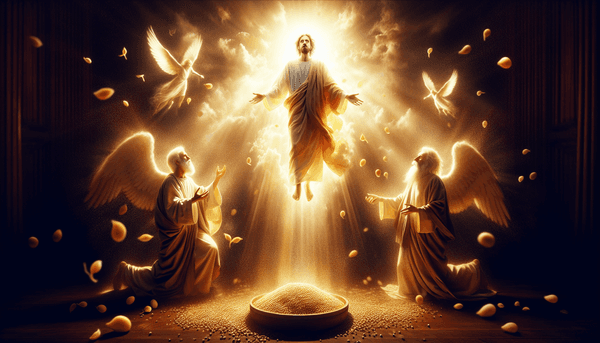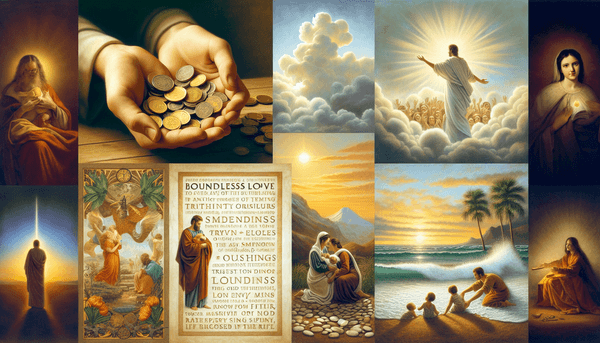The Significance of Moses and Elijah During the Transfiguration
One of the most striking events in the New Testament is the Transfiguration of Jesus, where He is revealed in divine glory before the eyes of Peter, James, and John. This momentous event, as recounted in Matthew 17:1-9, is accentuated by the appearance of Moses and Elijah, conversing with Jesus. Moses, the giver of the Law, and Elijah, a mighty prophet, stand as pillars of the Old Testament, symbolizing the Law and the Prophets respectively. Their presence alongside Jesus signifies the continuity between the Old and New Covenants, bridging the gap and affirming Jesus as the fulfillment of both (Luke 24:44). The voice from the cloud, declaring Jesus as God's beloved Son (Matthew 17:5), establishes His divine authority and sets the stage for the completion of God's redemptive work, previously foreshadowed in the law given through Moses (John 1:17) and the prophesied return of Elijah (Malachi 4:5-6).
The Power of Faith as Small as a Mustard Seed
Jesus' teaching on faith is both profound and encouraging, especially when He compares it to a mustard seed. In Matthew 17:20, Jesus explains that faith, even as small as a mustard seed, can move mountains, illustrating that the size of our faith is less important than its authenticity. This concept encourages believers to trust in God's promises, for even small, sincere faith can lead to remarkable outcomes (Mark 11:22-24). The writer of Hebrews defines faith as the assurance of things hoped for and the conviction of things not seen (Hebrews 11:1), while James emphasizes the need for faith to be accompanied by action (James 2:17-18). These teachings remind us that our faith, though it may start small, has the potential to grow and produce mighty results in our lives and the world around us.
Understanding Matthew Chapter 17
Matthew chapter 17 is a powerful narrative that captures the essence of Jesus' divine nature and mission. The Transfiguration is a pivotal moment where Jesus' divine glory is revealed, a visible testament to His identity as the Son of God. Peter, James, and John witness this extraordinary event, where Jesus shines with a brilliance akin to the sun, and His garments become dazzling white. The disciples' reaction, a combination of awe and fear, reflects the overwhelming nature of this revelation (Matthew 17:6). This scene not only affirms Jesus' divinity but also foreshadows the coming glory of the kingdom of God. The echoes of Old Testament figures and themes throughout the account, such as Moses' radiant face after speaking with God (Exodus 34:29) and the vision of the Son of Man in Daniel 7:13-14, highlight the fulfillment of God's promises and the continuity of His salvific plan.
The Warning of 2 Peter 2:20
In the New Testament, believers are cautioned about the seriousness of apostasy. 2 Peter 2:20 warns of the dangers of returning to a life of sin after having come to know Christ. This scripture serves as a solemn reminder to persevere in faith and avoid becoming entangled again in the corruption of the world. Hebrews 6:4-6 speaks to the dire consequences of falling away after having received the Holy Spirit, and Galatians 5:1 urges believers to stand firm in the freedom Christ has provided. Peter further advises Christians to be on guard against false teachings (2 Peter 3:17), while Paul warns in 1 Corinthians 10:12 that those who think they stand firm should take care lest they fall. These passages underscore the importance of steadfast faith and the transformative effect of knowing Christ.
The Problem of Evil
The question of why a loving God allows evil is one of the most profound challenges for believers. Scripture offers insights into the complex interplay between free will and divine sovereignty. The narrative of the fall in Genesis 3:1-19 introduces the concept of human choice, leading to the presence of evil in the world. Despite the reality of suffering and wrongdoing, Christians find hope in the assurances of Romans 8:28, which promises that God works all things for the good of those who love Him. The vision of a new creation in Revelation 21:4, where pain and death are no more, offers a future hope of redemption and renewal. The book of Job explores the mystery of evil and suffering while affirming God's ultimate control. James 1:13-15 reminds us of our personal responsibility in the face of temptation.
Conclusion
Through the exploration of these biblical themes, we find that the teachings of Jesus and the events of the New Testament are deeply relevant to our lives today. The Transfiguration, the concept of faith as small as a mustard seed, and the continuity of God's plan throughout Scripture, all speak to the enduring power and wisdom of God's Word. As believers, we are called to nurture our faith, trust in God's promises, and live in daily reliance on His guidance. By heeding the warnings and embracing the promises found in the Bible, we can navigate the complexities of life with confidence and hope. Let us move forward with a faith that, though it may begin as a tiny seed, has the potential to grow and bring about transformative change in ourselves and the world around us.
FAQ
Q: What is the relevance of Moses and Elijah appearing and talking with Jesus during the transfiguration?
A: Moses and Elijah's appearance during the transfiguration demonstrates the continuity between the Old Testament and the New Testament. Moses represents the law, and Elijah represents the prophets, affirming that Jesus is the fulfillment of both and emphasizing His divine authority.
Q: How does the concept of faith as small as a mustard seed apply to our daily lives?
A: The concept of faith as small as a mustard seed applies to our daily lives by reminding us that even a small, genuine trust in God can lead to extraordinary outcomes. It encourages believers to have faith in God's promises and to approach life with a sense of reliance on His power.
Q: What does Matthew chapter 17 mean?
A: Matthew chapter 17 recounts the transfiguration of Jesus, where His divine glory is revealed and affirmed by God's voice. This chapter highlights Jesus' authority as the Son of God and the fulfillment of the law and the prophets. It also serves as a testament to the continuity of God's plan throughout history.
Q: What is Matthew 17:20 all about and what is its relevance in the life of present believers?
A: Matthew 17:20 speaks about the power of faith, illustrating that even the smallest amount of faith can lead to great change. For present believers, this verse serves as an encouragement to trust in God's ability to work in and through us, knowing that with Him, nothing is impossible.






